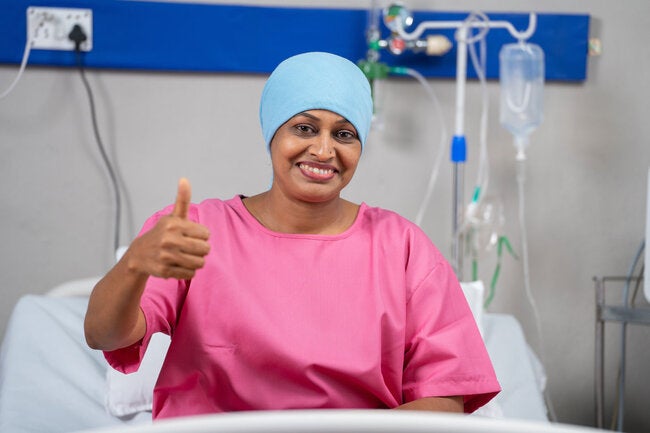
PAHO calls on Latin American and Caribbean countries to improve access to essential cancer medicines and supplies
February 4, 2025
Washington, DC, February 3, 2025 (PAHO) – On the eve of World Cancer Day (February 4), the Pan American Health Organization (PAHO) urges governments in Latin America and the Caribbean to prioritize access to essential cancer medicines, supplies, and equipment. Cancer remains a leading cause of death in the Americas, claiming the lives of more than 1.4 million people and resulting in more than 4 million new cases each year.
Dr. Jarbas Barbosa, PAHO Director, stressed the need to improve access to treatment. “We must work toward a future where no one is without the cancer care they need to survive,” he said. “Improving equitable access to these treatments is essential for better outcomes and quality of life.”
Although progress has been made, several obstacles remain, including high costs, inefficient procurement systems and limited distribution networks. Addressing these challenges requires a comprehensive approach, including updated treatment protocols and pooled purchasing to increase predictability and address the high price of cancer drugs.
Inequality in the treatment of childhood cancer
The disparity in childhood cancer care is particularly concerning. In Latin America and the Caribbean, an estimated 30,000 children and adolescents under the age of 19 will be diagnosed with cancer each year. Of these, nearly 10,000 will die from the disease. In high-income countries, more than 80% of children with cancer are cured, but in many low- and middle-income countries, the cure rate is around 20%. “The gap in survival rates is largely due to limited access to affordable, quality-assured medicines,” said Dr. Mauricio Maza, PAHO Regional Advisor on Cancer.
PAHO also continues to work with global partners to improve childhood cancer care. Through the Global Platform for Access to Childhood Cancer Medicines, PAHO works with WHO, St. Jude Children’s Research Hospital, and UNICEF to ensure a continued supply of affordable, quality cancer medicines in low- and middle-income countries (LMICs). In 2024, PAHO signed an agreement with St. Jude to implement the platform in Latin America and the Caribbean, with the aim of scaling up access efforts and strengthening national planning and procurement capacities, including improving supply chain resilience for childhood cancer treatments. These partnerships are critical to closing the child survival gap in low- and middle-income countries.
The PAHO Strategic Fund is a vital tool to improve access to cancer medicines. “We urge all countries in the region to better utilize this resource, which offers essential cancer medicines, as well as Human Papillomavirus (HPV) tests for cervical cancer screening and cervical pre-cancer treatment devices, critical tools needed for cervical cancer elimination,” added Dr. Barbosa.
Eliminating cervical cancer: an achievable goal
Cervical cancer continues to claim the lives of approximately 40,000 women in the Americas each year, but with the right strategies – HPV vaccination, screening and treatment – it could be eliminated as a public health problem. Cervical cancer is one of 30 diseases and related conditions that PAHO aims to eliminate as part of its Initiative for the Elimination of Diseases.
To achieve this, three targets must be met by 2030: achieving 90% coverage of HPV vaccination among 15-year-old girls; 70% coverage of screening with high-accuracy tests among 35- and 45-year-old women; and ensuring that 90% of precancerous lesions and invasive cancer cases receive treatment.
In the region, 48 out of 51 countries and territories have already introduced HPV vaccination, and half of them are using the single-dose regimen, which is increasing uptake and coverage. PAHO is helping countries access HPV vaccine at affordable prices through its Revolving Fund and is promoting the adoption of HPV screening tests, which most countries have already started implementing. Although many are still in the early stages, four countries have already integrated these tests into their national programs. Finally, PAHO, with support from the World Health Organization (WHO) and UNITAID, has donated thermal ablation devices for the treatment of precancerous lesions in seven countries.
World Cancer Day Webinar
To mark World Cancer Day, PAHO will organize a virtual seminar February 4, 2025, at 11:00 a.m. (EST, Washington DC time), featuring experts, health officials from Argentina and Ecuador, and key organizations discussing challenges and solutions in cancer care. The webinar will focus on improving access to oncology drugs and supplies in the region. Click here to register.
